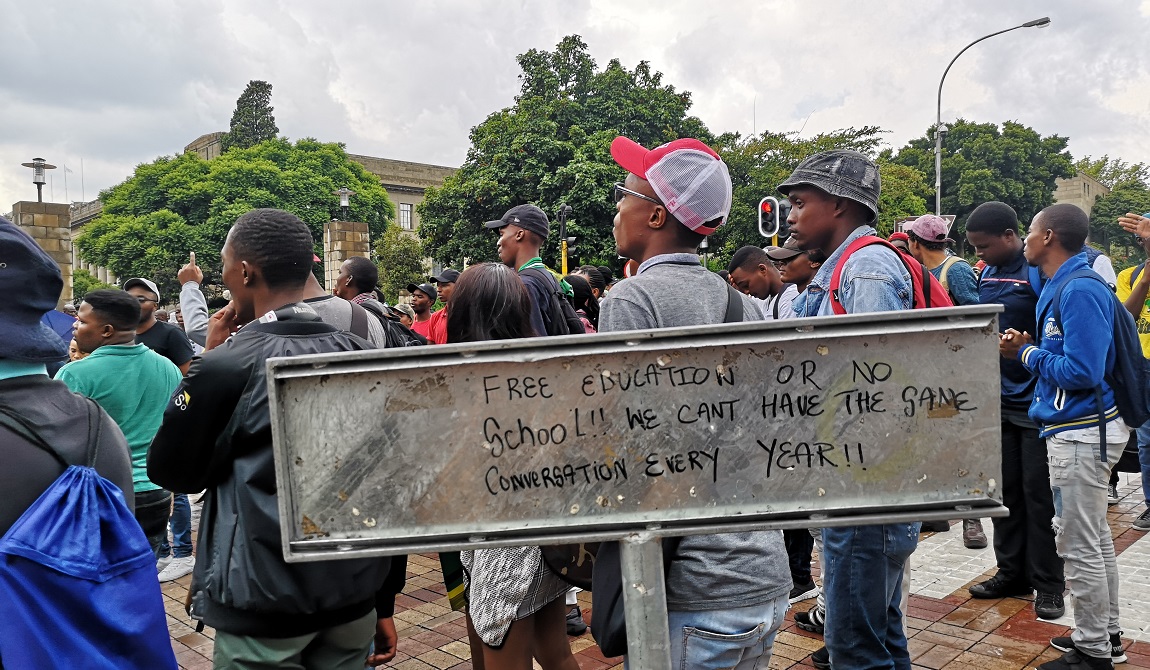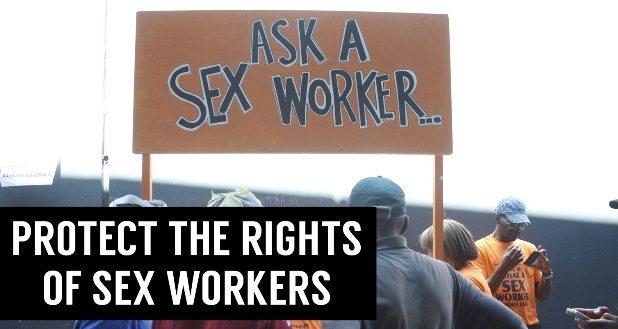
The cracks within the government’s free education plan are showing. While the policy increased access to higher learning, it also introduced numerous administrative issues like an overburdened National Student Financial Aid Scheme (Nsfas), homelessness because of a lack of student housing, and a registration nightmare for universities. By SHAAZIA EBRAHIM and FATIMA MOOSA.
The 2019 protests continue on Wednesday. This week the University of Johannesburg (UJ), Mangosuthu University of Technology (MUT), the University of KwaZulu Natal (UKZN) and Wits University all protested various barriers to study at their respective universities. At the Durban University of Technology (DUT), a student was killed in the name of access to education.
Although it’s over a year since former president Jacob Zuma announced free education on 16 December 2017, supposedly relieving students of protesting under #FeesMustFall and other banners, in reality, education is still not free.
Historical debt, in particular, is ruining students.
Historical debt has yet to be addressed
One of the reasons that students at Wits University are holding a hunger strike is historical debt. Students who owe the university money are unable to register. The Student Representative Council (SRC) of Wits say that the university backed out on an agreement where they discussed the registration fees issue with management.
Sibongile Sibeko, the SRC’s gender and transformation officer, said to The Daily Vox that the university agreed that students owing less than R100,000 would be allowed to register. Usually, students owing less than R10,000 are allowed to register.
The university retracted the agreement on Sunday night saying they couldn’t afford that.
Students have been protesting for government to scrap historical debt for years. However, there is no plan by the higher education department (or any other government department) for a way to deal with debt already incurred by students.
Some students don’t qualify for NSFAS & due to historical debt they can’t register. So as a part of the “missing middle” , they’re struggling. Some seniors and house comm members are being rejected at reses when they’re still suppose to complete their studies#Witshungerstrike https://t.co/WCVmIV6NlL
— ninos💞 (@timasetlana) February 5, 2019
For this plan of free education to work, the Department of Higher Education and Training (DHET) needs to address the problem of historical debt.
Who wants to give me R45000 because my historical debt just finished my scholarship money.
Sooo, about that Phd it may never happen.
— 1st name Swan, 2nd name Wane (@uThenjiwe_Igama) February 5, 2019
In an interview with Nsfas earlier this year, the financial aid scheme confirmed that they had not received any government commitment to write-off any outstanding student debts. Former beneficiaries still have to repay their loans in terms of their loan agreement.
The problem of accommodation
In 2018, many universities around South Africa were plagued by problems of accommodation. There is just not enough space for all students. More students were accepted due to the government’s free education. Yet, there was no space for all incoming students. At Wits, final-year and postgraduate students are apparently being pushed out of the university residences. This is to make a place for first-year students. Students are forced to stay in libraries, lecture halls, and bathrooms.
At Wits University, the internal residences are Barnato Hall, David Webster Hall, Ernest Oppenheimer Hall, Girton Hall, Jubilee Hall, Knockando Halls (Lighton Hall & Williams Hall), Medhurst Hall, Men’s Halls (College & Dalrymple), Reith Hall and Sunnyside Hall. Students have to pay between R50,000 to R70,000 for a single room plus meals. For self-catering rooms, students can pay anywhere between R40,000 and R80,000 depending on whether it is a single or double. Postgraduate students are expected to pay additional fees if they are staying longer than the undergraduate academic year.
Going through such internal conflict🤦ðŸ¾â€â™€ï¸. I’m not registered cause historical debt and I don’t have accommodation but instead of participating in the hunger strike I’m standing in a queue that isn’t moving😞
— mandisa (@pompitous_) February 5, 2019
Sibeko told The Daily Vox that the SRC had received 592 applications for students who are currently homeless and were sleeping in libraries and labs and sleeping in Solomon House concourse. She said the University is only providing 162 beds for those students.
#WitsStrike A Washing rack and toiletries in one of the female bathrooms at Wits.
Some students have been sleeping on campuses after being unable to find accommodation pic.twitter.com/hdaW3Wns6D
— POWER987News (@POWER987News) February 5, 2019
Students who are unable to get a place at an internal residence are often forced to find alternative accommodation. Southpoint is a private accommodation provider. Students staying there have to pay between R4000 to R5000 a month depending on a single or double room. This works out to between R48 000 to R60 000 a month for accommodation. Most Southpoint facilities are self-catering with meals not being provided.
“The university is implementing a new system in residences where they are phasing out older students. They are accepting more first-year students than they have in previous years which means that senior students are left without a place to stay. The university cannot say they are only going to prioritise first-year students and phase senior students out of the residences,” she says.
Fees Must Fall 3.0? Postgrad Funding Is The Next Student Crisis
According to Wits, they have 6,200 beds available for students and working with external service providers to secure additional accommodation. The Wits Hardship Fund has been set up to help students in need of assistance. The university says through this fund 80 students have been helped with urgent accommodation.
In 2018, the University of Venda and Limpopo were shut down over issues with payment of Nsfas to students. These payments included allowances for accommodation.
The Department of Higher Education needs to step up and address all the concerns being faced by universities around the country. Otherwise the issue is only going to grow.








